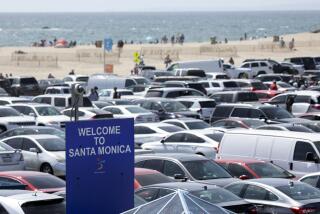SEAL BEACH : Old Town Parking Debate Heats Up
- Share via
It takes only a slow, midafternoon drive down car-clogged Main Street to see that the business district here has more automobiles than parking spaces.
For nine years, Seal Beach’s answer to this dilemma has been a complex policy that requires businesses that cannot provide enough parking to pay the city for each missing parking space.
But in recent months, this in-lieu parking policy has come under fire from residents and some City Council members who see it as unfair and ineffective.
Now, one council member wants to form a special citizens commission to look into the issue. If created by the full council, the commission is sure to intensify the debate over parking in the Old Town district.
“At this point, we really need to hear what the residents have to say about this,” said Councilman Frank Laszlo, who proposed forming the panel at a recent council meeting. “After that, we can decide what to do about the situation.”
If the commission is created, members are likely to get an earful of criticism about the in-lieu parking plan, which has been controversial ever since it was started in 1984.
Many of the businesses that pay in-lieu parking fees are on Main Street, which is lined with older buildings that were not designed under the city’s current parking code requirements.
While some Main Street merchants rent parking spaces from nearby businesses with parking lots, many others pay the city $100 a year for each missing space. For some popular restaurants, the annual in-lieu fees top $3,000.
The problem, residents said, is that the fees do nothing to ease the parking shortage because Seal Beach has never used the $18,000 a year in revenue to build new parking lots.
“These are phantom parking spaces,” said community activist Charles Antos. “It does nothing to solve the problem.”
As a result, residents said, customers who can’t find a parking place on Main Street simply drive into nearby residential areas, making it more difficult for people who live in the area to find parking.
Laszlo and others hope that a commission will be able to measure the public’s views on the parking situation, making it easier for the council to find a solution.
“Once we know what the people want, we can decide what to do,” he said.
More to Read
Sign up for Essential California
The most important California stories and recommendations in your inbox every morning.
You may occasionally receive promotional content from the Los Angeles Times.

![Los Angeles, CA - May 19: Carlos Vargas, left, and Paulina Rubio, members of the harm reduction team from Homeless Outreach Program Integrated Care Systems [HOPICS], a leading homeless services and housing agency, look for drug addicts to help and pass out supplies at a homeless RV encampment along 77th St. in South Los Angeles Friday, May 19, 2023. The team hands out syringes, fentanyl test strips, overdose reversal nose spray and medication to prevent overdoses, infection and disease transmission, including the HIV virus. Fenanyl is particularly insidious because it can be found in all other drugs, especially meth and heroin. The handouts are also meant to reduce infection through broken pipes, which can cut users mouths and open them to infection. . (Allen J. Schaben / Los Angeles Times)](https://ca-times.brightspotcdn.com/dims4/default/530e2db/2147483647/strip/true/crop/3900x2608+0+34/resize/320x214!/quality/75/?url=https%3A%2F%2Fcalifornia-times-brightspot.s3.amazonaws.com%2Fe9%2F77%2F4b8bd35d4881a3edec6b945b143b%2F1298639-me-soaring-fentanyl-deaths-24-1-ajs.jpg)












